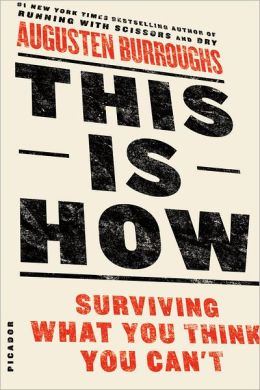I have never been a great fan of “self-help” books. If they were that good, why are the Bookazine shelves loaded down with so many self-help titles? However, with a review stating “The last self-help book you’ll ever read,” I broke my rule and took “This is How Surviving What You Think You Can’t” by Augusten Burroughs (ISBN 978-1-250-03210-2, Picador Publishing, 2012) home for review.
The back cover has the promise for all people who are having problems surviving. These include being fat and failing every diet, lost jobs, death of a child, ending up with the wrong kind of person, your parents are insane, if you feel lost in this world and more, covering most human dynamics.

It is a hard-hitting book peppered with some very down to earth vernacular, so not to be left in the reach of impressionable children. He states clearly that if you are going to be introspective, then you must do so with honesty. “This is why your search for the solution to the problems, issues and obstacles you’re dealing with in your own life must begin with your mouth. Specifically the lies that come out of it.”
Many self-helpers stress on the fact that they are single. Burroughs says, “Being single isn’t a real problem. It becomes a real problem only when you believe the powers and forces of the universe have conspired against you. When this happens, you’ve begun supernatural thinking.” He gives the answer to this problem, “If you’re single and don’t want to be, meet more people. It is, in fact, that easy.” He does offer an alternative for those who still fail. “If you remain unhappily single, my suggestion is that you employ the services of a cat or a dog.”
He devotes one chapter to How to be Confident. He sees that “confidence is not something you feel or possess; it’s something others use to describe what they see when they look at you.” That being the case, he suggests that you become task conscious, rather than self conscious, and gives various examples of just how you do that. An excellent chapter in this book.
At B. 545, Augusten Burroughs does give the reader many plans and options in attempting to cope, and it certainly isn’t muttering mantras in front of the mirror each morning. In fact he is very much an anti-mantra man stating “Affirmations are dishonest. They are a form of self-betrayal based on bogus, side-of-the-cereal-box psychology.” And that advice is on page 4 with 226 more to go.
Is it the last self-help book you’ll ever read? Somehow, I think not. The self-help addicts remain self-help addicts as a means of survival, themselves associating with others with the same needy psyche. He writes of the overweight person, “If I’m thin, I won’t have my weight issue as company any more. I’ll be entirely alone. I’ll be entirely exposed.” However, the book does have many good ideas and advice for those on the back cover. But much depends upon taking the advice on board and change in lifestyle.




